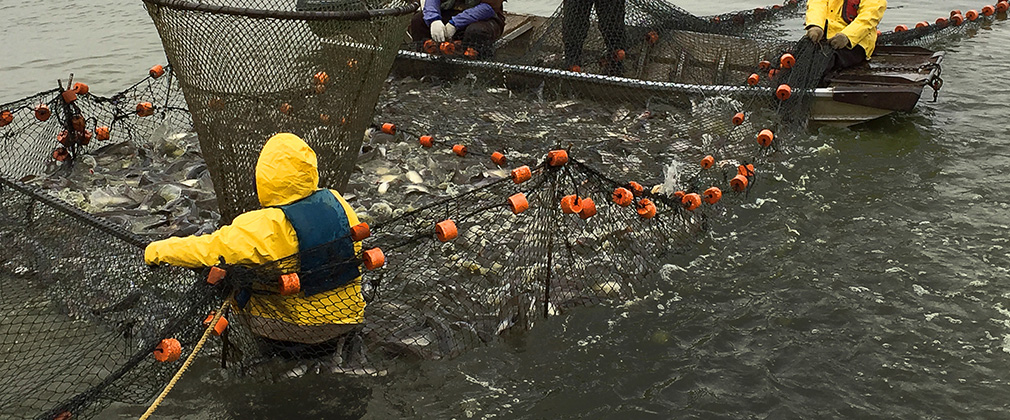Seafood, Public Health & Food Systems
 As harvests from worldwide fisheries plateau or decline due to overfishing, pollution, and other factors, aquaculture production has been increasing to meet a growing global demand for seafood. Aquaculture is the farming of aquatic species including plants, shellfish, crustaceans, and fish. Farmed seafood can be highly sustainable, but unfortunately, some forms of aquaculture can lead to public health risks due to the use of chemicals and antibiotics, bioaccumulation of contaminants through feed made from fishmeal, diseases and pollution from farmed animals reducing wild populations and threatening food security for local communities, and increasing pressure on limited cropland and resources to produce crop-based feed for an expanding industry.
As harvests from worldwide fisheries plateau or decline due to overfishing, pollution, and other factors, aquaculture production has been increasing to meet a growing global demand for seafood. Aquaculture is the farming of aquatic species including plants, shellfish, crustaceans, and fish. Farmed seafood can be highly sustainable, but unfortunately, some forms of aquaculture can lead to public health risks due to the use of chemicals and antibiotics, bioaccumulation of contaminants through feed made from fishmeal, diseases and pollution from farmed animals reducing wild populations and threatening food security for local communities, and increasing pressure on limited cropland and resources to produce crop-based feed for an expanding industry.
Because seafood can be a good source of lean protein, omega-3 fatty acids, and other nutrients, the challenge is to evaluate the potential health benefits of consuming farmed seafood in light of its possible health risks, as well as the potential environmental risks of expanding the industry. Some aquaculture producers, such as those using recirculating aquaculture systems, have embraced more ecologically responsible farming techniques.
Our work aims to increase public health professionals’ involvement with aquaculture. To that end, we conduct and support research, provide technical assistance and expertise to other organizations, and educate policy makers and the public about aquaculture issues.
Other activities of the Seafood, Public Health & Food Systems Project include:
- Examining trends in resource use, nutritional quality, and the environmental footprint of the rapidly growing aquaculture industry;
- Identifying regulatory gaps that can threaten public health and the environment;
- Investigating oyster aquaculture in the Chesapeake Bay region as a sustainable alternative to wild oyster harvesting;
- Supporting faculty, staff, and doctoral student research at Johns Hopkins University through the Aquaculture, Public Health, and the Environment Research Grant Program.
For further information on the project, contact Liz Nussbaumer.
Related Links
- Emerging COVID - 19 impacts, responses, and lessons for building resilience in the seafood system. Global Food Security 2021
- Assessing Fish to School Programs at 2 School Districts in Oregon. Health Behavior and Policy Review, December 2020
- Risks shift along seafood supply chains. Global Food Security, December 2020
- Loss and waste in fish value chains: A review of the evidence from low and middle-income countries. Global Food Security, 2020
- Food Sources and Expenditures for Seafood in the United States. June 2020
- Veterinary drug use in United States net pen Salmon aquaculture: Implications for drug use policy, December 2019
- Ecosystem and Public Health Risks from Near- and Offshore Finfish Aquaculture, Revised August 2018
- Wasted seafood in the United States: Quantifying loss from production to consumption and moving toward solutions (News Release, Infographic), Global Environmental Change, September 6, 2015
- Our Seafood Choices: Health and Sustainability, NYT Letter to the Editor, June 2015
- Offshore Finfish Aquaculture in the United States: An Examination of Federal Laws That Could be Used to Address Environmental and Occupational Public Health Risks, International Journal of Environmental Research and Public Health, November 2014
- Public Health Perspectives on Aquaculture, Current Environmental Health Reports, July 2014.
- Study Analyzes Half-Century of Oyster Poaching Enforcement in Maryland (Research Brief)
- Testing of Seafood Imported into the U.S. Is Inadequate, November 2011.
- Aquaculture practices and potential human health risks: Current knowledge and future priorities, Environment International, 2008.
- Food and Water Watch Smart Seafood Guide